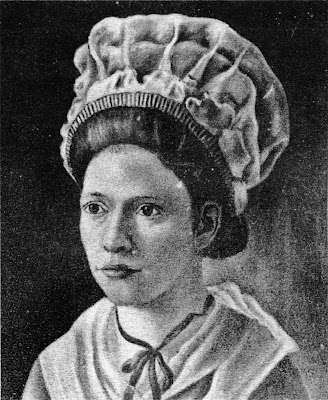Salopia antiqua: or, An enquiry from personal survey into the 'druidical,' military, and other early remains in Shropshire and the north Welsh borders; with observations upon the names of places, and a glossary of words used in the county of Salop (Google eBook) written by the Rev. Charles Henry Hartshorne printed at the University Press, Cambridge. London: John W. Parker, West Strand. 1841.
WHIPPET, s. a dog bred betwixt a greyhound and a spaniel.
NAGG, v. to bite at, snap. Ex. "Jim's whippet nagged at my heels."
Senin, 20 Desember 2010
Kamis, 02 Desember 2010
Early American Spy Lydia Barrington Darragh
.

It is said that on the night of December 2, 1777, Irish-born Philadelphia nurse Lydia Barrington Darragh (1729-1789) potentially saved lives for General George Washington's Continental Army, when she overheard the British planning a surprise attack on Washington's army for the following days.
On Second Street in Philadelphia, directly opposite the headquarters of Sir William Howe, the British commander, lived a Quaker couple, William & Lydia Darrah. Howe’s adjutant general took over part of the Darrah home for his quarters. On December 2, 1777, he advised Lydia to send all her family to bed early, apparently in anticipation of a meeting to be held at their home. At this time, Philadelphia was occupied by the British.
When Howe's headquarters proved too small to hold meetings, he often commandeered a large upstairs room in the Darraghs' house. Although uncorroborated by contemporary written evidence, family oral history relates that Mrs. Darragh regularly would eavesdrop & take notes on the British meetings from an adjoining room & would conceal the notes by sewing them into her coat before passing them onto American troops stationed outside the city.
On the evening of December 2, 1777, Darragh overheard the British commanders planning a surprise attack on Washington's army at Whitemarsh, Pennsylvania, for December 4 & 5.
The morning after the British meeting in her home, determined to get word to the patriots, 48-year-old Lydia crossed the street to Howe’s headquarters & requested a pass to go to a miller at Frankfort to obtain flour. With the pass, she went through the British lines, left her bag to be filled at the mill, and then hurried northward, and delivered her warning.
Lydia then returned to the mill, paid for her bag of flour, and re-entered the city, unsuspected. The forewarned Washington intensified his patrols. She never made the story public during her lifetime, & her daughter told people about her heroism after her death.
The British did march towards Whitemarsh on the evening of December 4, 1777, & were surprised to find General Washington & the Continental Army waiting for them. After three inconclusive days of skirmishing, General Howe chose to return his troops to the relative safety of Philadelphia.
.

It is said that on the night of December 2, 1777, Irish-born Philadelphia nurse Lydia Barrington Darragh (1729-1789) potentially saved lives for General George Washington's Continental Army, when she overheard the British planning a surprise attack on Washington's army for the following days.
On Second Street in Philadelphia, directly opposite the headquarters of Sir William Howe, the British commander, lived a Quaker couple, William & Lydia Darrah. Howe’s adjutant general took over part of the Darrah home for his quarters. On December 2, 1777, he advised Lydia to send all her family to bed early, apparently in anticipation of a meeting to be held at their home. At this time, Philadelphia was occupied by the British.
When Howe's headquarters proved too small to hold meetings, he often commandeered a large upstairs room in the Darraghs' house. Although uncorroborated by contemporary written evidence, family oral history relates that Mrs. Darragh regularly would eavesdrop & take notes on the British meetings from an adjoining room & would conceal the notes by sewing them into her coat before passing them onto American troops stationed outside the city.
On the evening of December 2, 1777, Darragh overheard the British commanders planning a surprise attack on Washington's army at Whitemarsh, Pennsylvania, for December 4 & 5.
The morning after the British meeting in her home, determined to get word to the patriots, 48-year-old Lydia crossed the street to Howe’s headquarters & requested a pass to go to a miller at Frankfort to obtain flour. With the pass, she went through the British lines, left her bag to be filled at the mill, and then hurried northward, and delivered her warning.
Lydia then returned to the mill, paid for her bag of flour, and re-entered the city, unsuspected. The forewarned Washington intensified his patrols. She never made the story public during her lifetime, & her daughter told people about her heroism after her death.
The British did march towards Whitemarsh on the evening of December 4, 1777, & were surprised to find General Washington & the Continental Army waiting for them. After three inconclusive days of skirmishing, General Howe chose to return his troops to the relative safety of Philadelphia.
.
Langganan:
Komentar (Atom)
Popular Posts
-
. 1757 Joseph Badger (1708-1765). Rebecca Orne (later Mrs. Joseph Cabot) 1765 John Singleton Copley (1738-1815). Frances Deering Wentworth (...
-
The Gossips Oil on canvas Painting for The Saturday Evening Post cover March 6, 1948 Ken and Katharine Stuart Collection From wallpape...
-
The Gossips Oil on canvas Painting for The Saturday Evening Post cover March 6, 1948 Ken and Katharine Stuart Collection From wallpape...
.+Rebecca+Orne+(later+Mrs.+Joseph+Cabot).+Worcester+Museum+of++Art..jpg)
